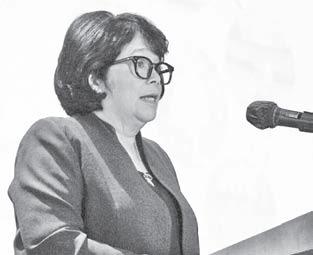
2 minute read
GDP growth in Q2 not seen as robust as Q1–think tank EPR Act implementor, author push timely compliance with law
By Butch Fernandez
BOTH the author and the main implementor of a 2022 law mandating large enterprises to take responsibility for the proper and effective recovery, recycling and disposal of plastic packaging used for their products—after these are sold and used by consumers—agree that the law is a work in progress, but ensuring strict compliance is crucial given the environmental crisis facing the country.
Sen. Cynthia Villar, author of Republic Act 11898, or the Extended Producer Responsibility Act of 2022, also stressed the need to encourage micro, small and medium enterprises (MSMEs) “to participate as well” even though only large enterprises are mandated to comply with the law enacted in July 2022. “In my view, the cooperation of MSMEs is crucial for the EPR compliance of obliged large enterprises (OEs), as MSMEs often service as conduits for the distribution of products from large enterprises to the consuming public,” Villar said in her speech at the B usiness M irror Coffee Club Forum at Bellevue Manila in Alabang.
The Coffee Club returned to its face-to-face format for the first time since the pandemic, but with option for virtual participation as it was livestreamed on BM’s Facebook.
Speaking after Villar, Secretary Maria Antonia Yulo Gonzaga of the Department of Environment and Natural Resources thanked Villar for trusting the DENR to be the Main implementor of the landmark law, but added that its success hinges on a “whole-of-society, whole-of-government approach,” additng that this is a job that requires “all hands on deck.”
The DENR issued the implementing rules and regulations for RA 11898 in January this year, and the so-called “obliged enterprises” have until the end of this year to meet the first milestone of a phased compliance, show proof they have recovered a minimum of 20 percent of the plastic packaging waste they distributed in 2022.
This target, as detailed by Villar in her speech, “rises to 40 percent in 2024, 50 percent in 2025, 60 percent in 2026, 70 percent in 2027 and 80 percent in 2028 and every year after.”
It is important, stressed Villar, that the DENR’s Environmental Management Bureau (EMB) educates the public on the benefits of the EPR.
Both Villar and Yulo Gonzaga urged the media to help bring up the number of obliged enterprises who have registered under the EPR law. The number currently stands only at 642, just a fraction of the estimated 4,000 enterprises that must be covered. It was during Villar’s stint as chair of the Senate Committee on Environment, Natural Resources and Climate Change in the 18th Congress that she authored the EPR Act of 2022. The goal, she told attendees at BM’s Coffee Club on Friday, “is to cut down on non-environmentally friendly packaging, boost recycling and promote effective waste recovery to mitigate environmental pollution.”

At the time she pushed enactment of the law, the country was facing alarming levels of marine pollution from plastic waste and a dismal failure to properly enforce the twodecade old solid waste disposal act.









